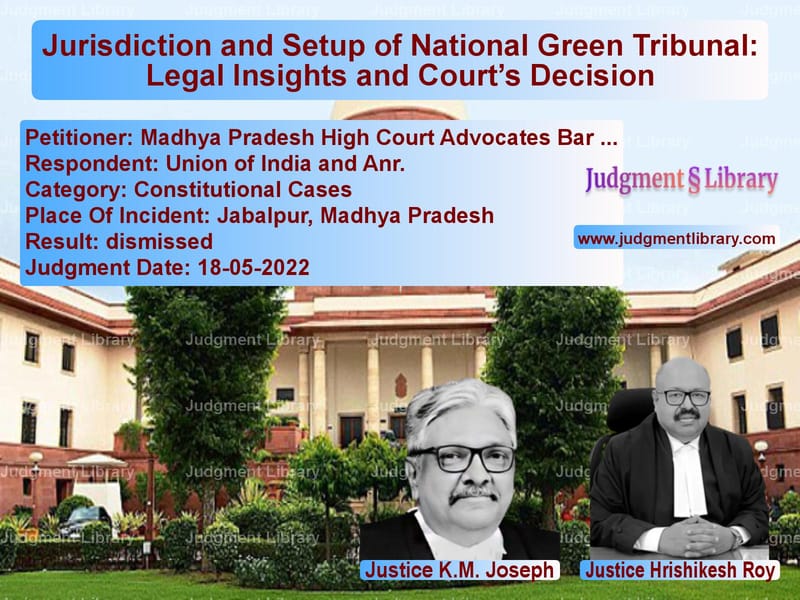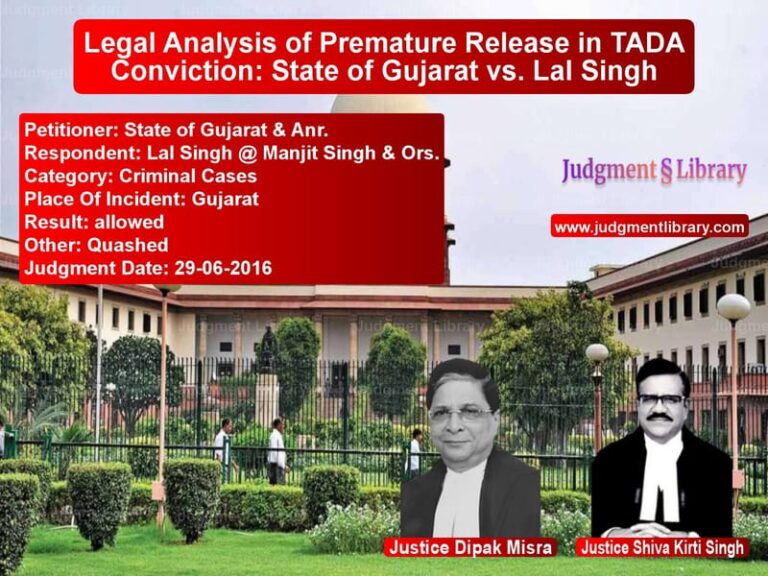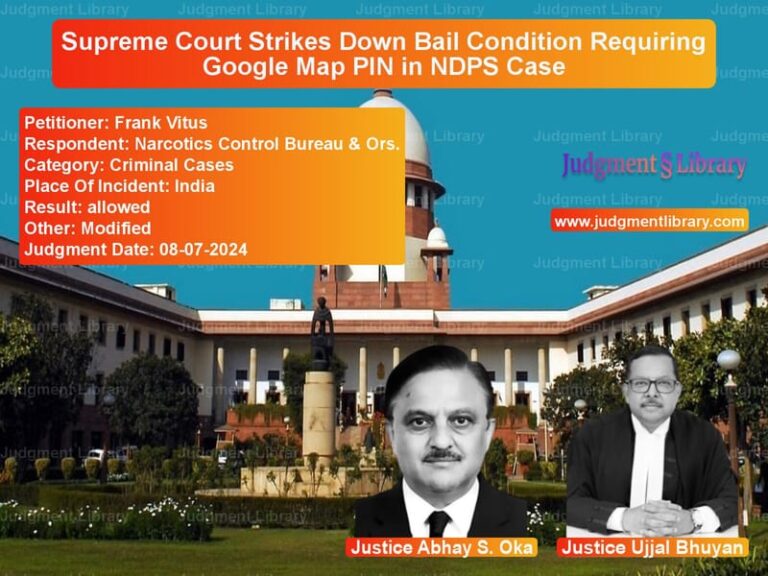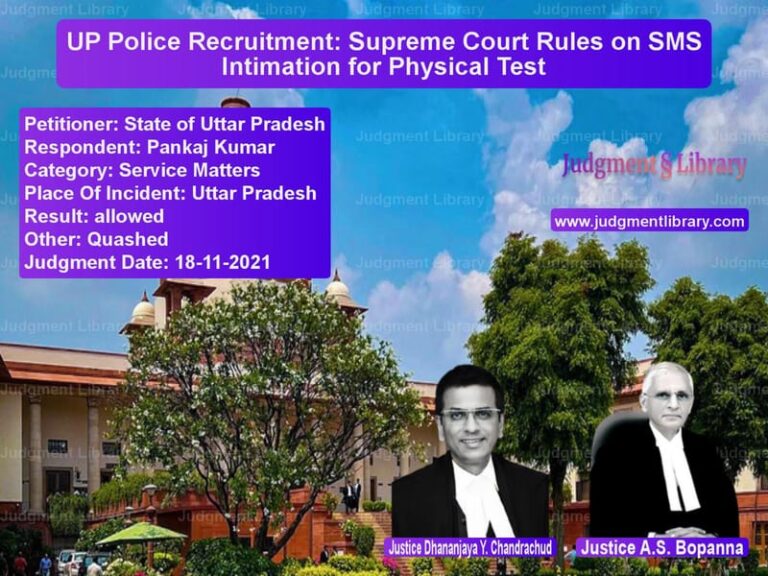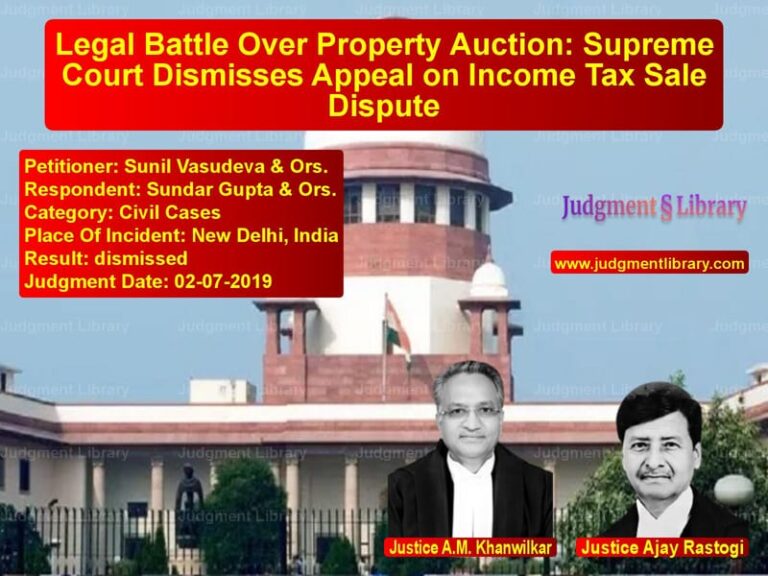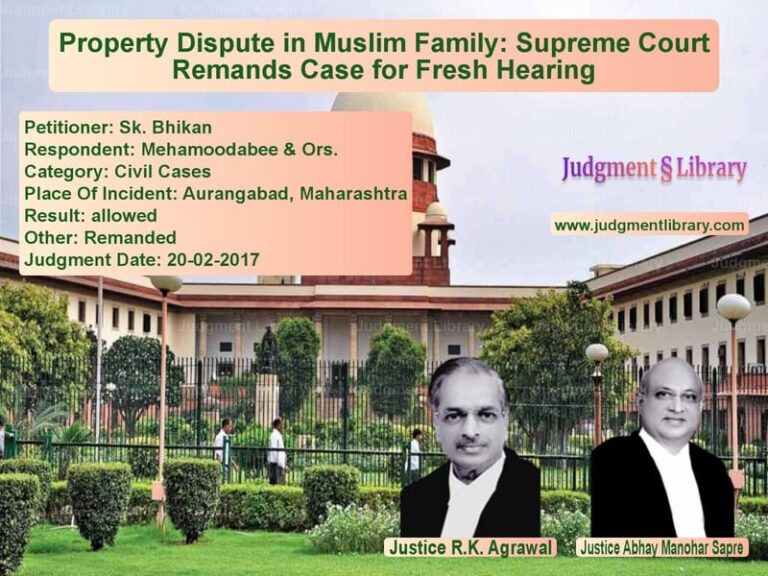Jurisdiction and Setup of National Green Tribunal: Legal Insights and Court’s Decision
The Madhya Pradesh High Court Advocates Bar Association and the District Bar Association, both based in Jabalpur, challenged the constitutional validity of the National Green Tribunal Act, 2010 (NGT Act) in this writ petition filed under Article 32 of the Constitution. The petitioners sought several declarations and orders, including a directive for setting up the National Green Tribunal (NGT) benches at the principal seat of the High Court in each state and a challenge to the jurisdictional provisions in the NGT Act. The petitioners also argued for a review of the appeal mechanism provided under the NGT Act and its implications for the High Court’s jurisdiction under Articles 226 and 227.
The petition raised four main issues for determination by the Court: first, whether the NGT Act ousts the jurisdiction of the High Courts under Sections 14 & 22; second, whether the NGT should have benches in every state or at the principal seat of High Courts; third, whether direct appeals to the Supreme Court from NGT decisions are constitutional; and fourth, whether Section 3 of the NGT Act suffers from excessive delegation to the Central Government.
Petitioner’s Arguments
The petitioners, representing the Jabalpur-based lawyers, argued that the Bhopal Bench of the NGT was arbitrarily chosen and inconsistent with the principle in the case of S.P. Sampath Kumar v. Union of India, where it was observed that for the effectiveness of a tribunal, it should be located at the principal seat of the High Court. The petitioners requested that NGT benches be set up in Jabalpur (for Madhya Pradesh) and other states where the principal seat of the High Courts is located.
Furthermore, the petitioners contended that the NGT Act’s Sections 14 and 22, which purportedly remove the jurisdiction of the High Courts in environmental matters, violated the basic structure of the Constitution. They also claimed that the NGT, despite being a specialized body, lacked the autonomy and effectiveness comparable to the High Courts. In particular, the conditions of service and tenure of NGT members were not on par with those of High Court judges, making it an inadequate substitute.
Respondent’s Arguments
On the other hand, the Union of India, represented by the Attorney General, argued that the NGT was set up as per the recommendations of the Supreme Court, with the objective of establishing specialized environmental courts. The NGT was created following the prodding of the Supreme Court in cases like M.C. Mehta v. Union of India, where the Court had urged the establishment of such specialized forums with qualified judges and technical experts.
The Attorney General also argued that the NGT’s establishment at Bhopal was a decision taken in consultation with the Supreme Court and that the location was approved due to its strategic and accessible position relative to Madhya Pradesh, Chhattisgarh, and Rajasthan. He further asserted that the High Court’s jurisdiction under Articles 226 and 227 remained unaffected by the NGT Act, and that litigants still had recourse to the High Courts.
The respondents emphasized that the NGT was designed to expedite environmental litigation with specialized expertise and that the direct appeal to the Supreme Court was constitutionally valid. They noted that the remedy of appeal to the Supreme Court was not an impermissible mechanism and should be seen as an effective way to deal with complex environmental cases.
Court’s Analysis and Conclusion
The Supreme Court evaluated the arguments presented and noted that the NGT was created to address multi-disciplinary environmental issues more efficiently. The Court emphasized that the power of judicial review vested in the High Courts under Articles 226 and 227 remained intact despite the provisions of the NGT Act, and the High Courts retained their jurisdiction to oversee the decisions of the NGT.
The Court also considered the necessity of specialized environmental courts and how the NGT was set up in line with the global push for better environmental governance. The Court found that the creation of NGT benches at strategic locations like Bhopal was well within the scope of the government’s discretion and had been approved by the Supreme Court. The Court ruled that there was no need to relocate the NGT bench from Bhopal to Jabalpur as it was strategically placed to serve multiple states and provide easy access to litigants.
Regarding the appeal process, the Court concluded that the direct appeal to the Supreme Court under Section 22 of the NGT Act was not unconstitutional. It was noted that this provision allowed for appeals on substantial questions of law, which was in line with the Court’s established approach to environmental cases. The Court held that litigants had sufficient remedies available under the Constitution, including petitions under Article 226, 227, and 136, to ensure access to justice.
Final Decision
In conclusion, the Supreme Court answered the issues in favor of the respondents, dismissing the petition. The Court ruled that the NGT Act did not oust the jurisdiction of the High Courts, the remedy of direct appeal to the Supreme Court was constitutionally valid, Section 3 of the NGT Act was not a case of excessive delegation, and the request to relocate the NGT Bench to Jabalpur was unmerited. The petition was dismissed, and the parties were directed to bear their own costs.
Petitioner Name: Madhya Pradesh High Court Advocates Bar Association and Anr..Respondent Name: Union of India and Anr..Judgment By: Justice K.M. Joseph, Justice Hrishikesh Roy.Place Of Incident: Jabalpur, Madhya Pradesh.Judgment Date: 18-05-2022.
Don’t miss out on the full details! Download the complete judgment in PDF format below and gain valuable insights instantly!
Download Judgment: madhya-pradesh-high-vs-union-of-india-and-a-supreme-court-of-india-judgment-dated-18-05-2022.pdf
Directly Download Judgment: Directly download this Judgment
See all petitions in Constitution Interpretation
See all petitions in Fundamental Rights
See all petitions in Environmental Cases
See all petitions in Judgment by K.M. Joseph
See all petitions in Judgment by Hrishikesh Roy
See all petitions in dismissed
See all petitions in supreme court of India judgments May 2022
See all petitions in 2022 judgments
See all posts in Constitutional Cases Category
See all allowed petitions in Constitutional Cases Category
See all Dismissed petitions in Constitutional Cases Category
See all partially allowed petitions in Constitutional Cases Category

